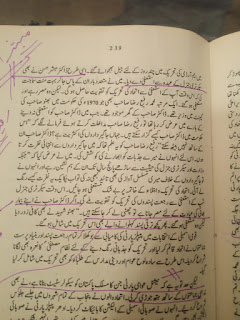History of PPP as told by its socialist arm Sh Rashid (Extracts with comments)
The book was published by Jang Publishers & then reprinted by Jumhoori publications & it is an autobiography of a pre-partition political worker of the Punjab who worked in All India Muslim League, Azad Pakistan Party of great Mian Iftiqaruddin, formed Kisan committee in 1952 and finally landed with his huge experience and following in PPP in 1967. He was among those PPP founders who in-spite of many reservations did not left the party for once till his death. His book is an essential part not only of PPP history but also an integral part of People's history of Pakistan. His frank analysis of the party as well as leadership is an essert for all political class in Pakistan. Although the book needs editing and more apendices but even in current form it covered all important events with little courage.
Will try to add more extracts/comments and this post is the beginning
Extracts/comments
1-The story of 4 Mozang road is still missing in the Party that worked as first headquarter of the PPP before its formal birth at 30th November 1967, here you can read names of political workers like student leader Amanullah, Zafryab, Iftiqar Ahmad, Sadiq Maseh, Rozi Khan, Ahsanullah Khan, Abdus Sttar Najam, Yousaf Samdani, Parveen Asghar, Musrat Shaukat, Aslam Gurdaspuri, Shahid Jamal Ansari, Avais Peerzada, Ziauddin Butt, Mahmud Butt etc. Among them many were also work in left groups because after the split of NAP,(1966) left workers were also divided in many factions. Numerous left groups were created in that period yet a huge majority of left workers remained aloof or lost confidence from left leaders primarily due to Pro Moscow & Pro Chinese alien conflict & also due to fierce factionalism.
2- Birth of Party, in political centre of Pakistan & capital of the Punjab, Lhore. Zulfiqar Ali Bhutto, the founder had no experience of people's politics yet he knew the mindset, priorities, weaknesses etc of power elite well. As a good reader he knew about people revolutions too. His father Sir Shahnawaz Bhutto was expelled from Sindh politics in mid 1930s along with Sir Abdullah Haroon. ZAB had started a new journey, from elite politics to People's politics. In elitiest Sind Club everyone knew ZAB well, he knew Sindhi elite including power brokers in Karachi too, but why he decided to form his party in the capital of the Punjab, Lhore? He had a close association with Karachi based communist leader Tufail Abbas as well as student leaders of Karachi NSF but he choose to winover Punjabis and due to his class base party policies Punjabis welcomed him unprecedentedly.
5- Dahqan, the intellectual journey ... setting the agenda... Azad Kausari, Mian Ijazul Hassan, Professor group P 161
6- How Punjab turned the tables first time in the history of People's struggle in Pakistan and defeated the elite, Bhutto rightly won the Punjab on class question but his opponents especially from progressive circle declared it an Anti India victory. It was a defeatist analysis because exponents of Shaukat Islam (right wing pro Yahya group under JI) were fierce enemy of India, very vocal but Punjab rejected them in 1970 elections. Out of 82 seats, ZAB won 62 seats (more than 70%) in the Punjab. Majority of other 20 seats were from South Punjab big landlords. Central Punjab & GT road was almost 90% with PPP. Sh sahib too accepted that forgotten truth. We got central government just because of the support of the Punjab. But now a days, since last two decades, PPP herself is practically negating such history and ready to divide Punjab , her birth place. See P159 below
7- In Power, Land reforms was an important landmark like Generic names bill about medicine but later forgotten by the party under the pressure of WB like international power brokers. Even today instead of wasting time in power gimmicks, party can revive those policies keeping in view the new changes especially connectivity & globalization with reference to People's perspective.
8- Dr Mubashir Hassan, Aitzaz Ahsan, Sadiq Hussain Qureshi, Ramay, Mumtaz Bhutto, Jatoi, Laghari, Kausar Niazi and many insiders who ditch the party time and again as recorded by Sheikh Rashid, baba e Socialism. Why secular Wali Khan had joined Nizam e Mustafa movement against Bhutto and than after 5th July 1977 Marshallah, he demanded accountability from military dictator Gen Zia ... phalay ahtisab...pher intikhab is also recorded by the author.
To be continue...........






















No comments:
Post a Comment